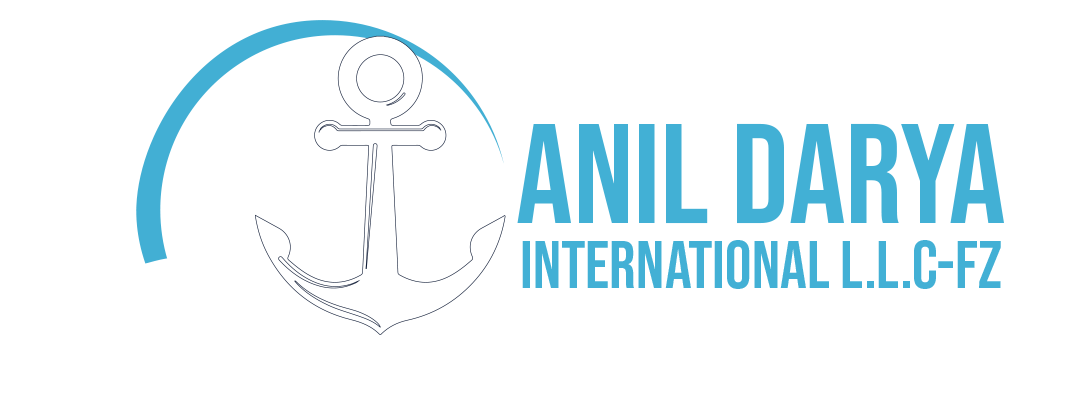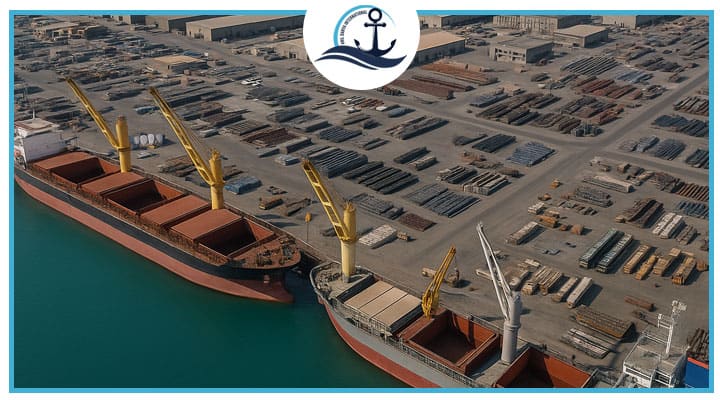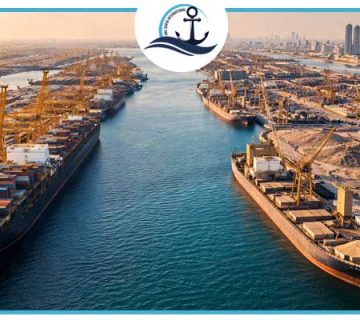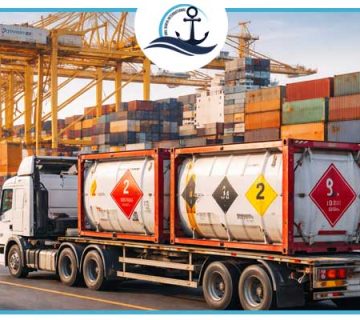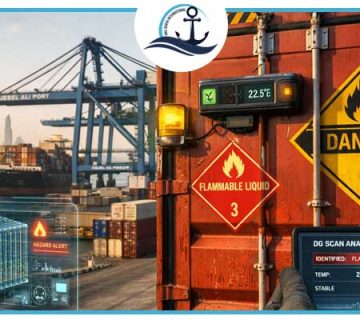|
Getting your Trinity Audio player ready...
|
How Dubai’s Logistics Free Zones Benefit Bulk & Break Bulk Shipping
Dubai has long been recognized as the beating heart of Middle Eastern trade — a bridge between Asia, Europe, and Africa. Over the past two decades, the Emirate has transformed itself into a global logistics powerhouse by building one of the most advanced networks of ports, airports, and multimodal corridors anywhere in the world. At the core of this transformation lies its logistics free zones — powerful economic ecosystems that simplify global trade, optimize freight flows, and create cost-effective solutions for international shippers.
For bulk and break-bulk cargo, these free zones have become game-changers. Whether your shipment consists of heavy machinery, steel coils, project cargo, or out-of-gauge equipment, Dubai’s free zones — especially JAFZA (Jebel Ali Free Zone) — provide unmatched flexibility, infrastructure, and customs advantages.
In this in-depth guide, we’ll explore exactly how these free zones benefit international traders, and how Anil Darya Shipping, one of Dubai’s specialized freight forwarders, leverages them to deliver seamless bulk and break-bulk shipping solutions from Dubai to the world.
Understanding Dubai’s Logistics Free Zones
Free zones are designated areas that allow companies to operate under a special regulatory framework — offering simplified customs procedures, tax exemptions, and full foreign ownership. In Dubai, over 30 active free zones cater to various sectors: from logistics and trade to aviation, technology, and industry.
When it comes to logistics and cargo handling, several stand out:
- JAFZA (Jebel Ali Free Zone) the largest logistics hub linked directly to Jebel Ali Port.
- Dubai Airport Free Zone (DAFZA) ideal for high-value or urgent air cargo.
- Dubai South Logistics District adjacent to Al Maktoum International Airport, designed for multimodal operations.
- Dubai Multi Commodities Centre (DMCC) central for trade, especially bulk commodities like metals and minerals.
Each of these zones offers customized incentives that make UAE free zone cargo operations faster, cheaper, and more efficient — whether it’s import, export, re-export, or transshipment.
Why Free Zones Are Vital for Bulk & Break Bulk Cargo
Bulk and break-bulk cargo don’t fit neatly into containers. They require flexible handling, open yards, cranes, storage yards, and specialized equipment. Most traditional customs zones can’t easily accommodate these complex logistics processes. That’s where free zones like JAFZA make all the difference.
Here’s how they benefit large-scale cargo movements:

a)Reduced customs complexity
Goods entering a free zone are not subject to import duties unless they enter the local UAE market. This means companies can import, consolidate, or re-export bulk cargo with zero customs delay.
b)Simplified re-export operations
Many international traders use Dubai as a transshipment hub — for example, moving goods from China to Dubai and then re-exporting them to Africa or Europe. Within a free zone, that’s fully legal and cost-effective, as no import VAT or duties apply during storage or re-export.
c)Multimodal access
JAFZA is directly connected to Jebel Ali Port, Dubai International Airport, and Al Maktoum International Airport, plus a growing rail link (Etihad Rail). This multimodal integration makes Dubai one of the few places where sea-air, air-sea, and road-sea combinations are operationally seamless.
d)Dedicated heavy-lift infrastructure
For project cargo or large industrial shipments, JAFZA and Dubai South feature dedicated heavy-lift cranes, Ro-Ro berths, and open storage areas — allowing ships to offload directly into free-zone yards.
e)Access to specialized logistics partners
Companies like Anil Darya Shipping, based in Dubai, operate directly within or adjacent to these free zones, enabling quick customs clearance, warehouse transfers, labeling, or repackaging — all within the zone’s regulatory comfort.
Spotlight on JAFZA: The Nerve Center of Bulk & Break Bulk Logistics
Established in 1985, Jebel Ali Free Zone (JAFZA) is the largest and most advanced free zone in the Middle East. Managed by DP World, it hosts over 9,500 companies from 130+ countries and contributes nearly 25% of Dubai’s GDP.
Its direct connection with Jebel Ali Port, one of the world’s top 10 container ports, makes it the preferred base for bulk and break-bulk shipping operations.
Key JAFZA Shipping Benefits:
- 100% foreign ownership: no local sponsor required.
- 0% corporate tax (on qualifying income for 50 years, renewable).
- Full profit and capital repatriation.
- No customs duties for imports/exports within the free zone.
- Integrated sea, air, and land logistics for global reach.
- Dedicated heavy-cargo facilities for project, bulk, and break-bulk handling.
For heavy industry players — from construction and oil & gas to manufacturing and renewable energy — JAFZA’s proximity to both port and industrial clusters allows synchronized supply chain management. For example, a turbine shipped from Europe can be offloaded at Jebel Ali Port, stored in JAFZA’s secure yard, reassembled, and re-exported to a GCC project — all without entering the domestic customs territory.
The Role of Anil Darya Shipping in Free Zone Logistics
As a specialized freight forwarder and logistics provider in Dubai, Anil Darya Shipping has built its expertise around navigating the unique advantages of Dubai’s free zones. The company’s team coordinates full logistics cycles for clients dealing with bulk, break-bulk, or hazardous cargo — including:
- Sea freight solutions via Jebel Ali Port and Hamriyah Port.
- Air freight via Dubai International and Al Maktoum Airports.
- Dangerous goods (DG) compliance, including IMDG and IATA labeling and documentation.
- Bulk & project cargo handling with specialized lifting, storage, and transport coordination.
- Customs clearance & documentation under UAE and IMO 2025 regulations.
Whether the cargo originates in China, India, or Europe, and the destination lies in Africa or the Gulf region, Anil Darya Shipping uses Dubai’s free zones as a strategic midway hub to optimize routing, minimize duties, and accelerate turnaround times.
If you’re seeking a reliable logistics partner who understands every nuance of Dubai’s free zones and how to use them for your cargo advantage, contact Anil Darya Shipping today. Our experts will tailor the most efficient multimodal strategy for your shipment — from origin to destination — leveraging JAFZA’s full potential.
From Bulk Terminals to Air Corridors — The Multimodal Advantage
One of Dubai’s biggest selling points is its multimodal connectivity. For bulk and break-bulk shipments, this integration means fewer handovers, shorter dwell times, and reduced costs.
For example:
- A steel shipment arriving by vessel at Jebel Ali Port can be unloaded, stored in JAFZA’s open yard, repacked, and flown to East Africa through a Sea-Air route — often 30–40% faster than pure sea freight and significantly cheaper than full air freight.
- Oversized machinery arriving by road from Oman or Saudi Arabia can be consolidated in Dubai South’s logistics district before export through Jebel Ali.
- Hazardous goods (DG) can be safely handled in approved free-zone facilities, compliant with IMDG and UAE DG Codes.
This flexibility transforms Dubai from a transit point into a value-added logistics platform.
Tax, Licensing & Financial Advantages for Cargo Operators
Operating in a logistics free zone also brings powerful financial incentives:
- No corporate or income taxes on most qualifying income streams.
- No import/export duties within the zone.
- Simplified licensing under Dubai’s free zone authorities (e.g., JAFZA, DAFZA).
- Full foreign ownership — crucial for international investors.
- Freedom of capital repatriation, allowing global reinvestment.
These conditions make Dubai’s free zones ideal for companies that want to use the UAE as a regional distribution hub — importing bulk materials in large quantities, storing them, then re-exporting in smaller lots to nearby markets.
Integration with Global Supply Chains
Beyond tax and operational benefits, free zones position Dubai as a logistics command center. Thanks to agreements with over 180 global shipping lines and direct air links to 220+ cities, Dubai provides unmatched accessibility.
For shippers handling:
- Bulk cargo cement, steel, minerals, food grains
- Break-bulk cargomachinery, construction equipment, vehicles
- Project cargo energy or infrastructure components
...the ability to consolidate, repackage, and reroute within Dubai gives them a competitive edge in speed, cost, and reliability.
Anil Darya Shipping capitalizes on this edge by offering end-to-end visibility, real-time tracking, and customized cargo management inside these free zones — ensuring clients never lose control over their shipments.
Sustainability & Digital Efficiency
Dubai’s free zones are increasingly adopting smart logistics and green shipping initiatives — aligning with the UAE’s Net Zero 2050 vision. Smart warehouses use automation and IoT sensors to monitor cargo conditions, while digital customs platforms reduce paper waste and manual errors.
For environmentally conscious clients — especially in industries transitioning to low-carbon freight — this matters.
Anil Darya Shipping actively supports such initiatives, offering optimized route planning, fuel-efficient vessel options, and sustainable packaging practices for clients operating through JAFZA and other free zones.
Real-World Example: The Free Zone Advantage in Action
Imagine a construction firm importing 2,000 tons of prefabricated steel from China to Dubai for a Gulf infrastructure project. Instead of direct import to mainland UAE, the cargo enters JAFZA as UAE free zone cargo.
Inside the zone, Anil Darya International L.L.C-FZ coordinates:
- Offloading from vessel and temporary storage in JAFZA’s open yard.
- Inspection and labeling under IMDG compliance.
- Re-packing and consolidation for overland transport to Kuwait.
The entire process is completed without import duties, without additional customs delays, and with 25% lower cost compared to mainland clearance.
That is the tangible power of Dubai’s logistics free zones.
Frequently Asked Questions (FAQ)
The key advantage is cost and time efficiency — no import duties, simplified re-export processes, and direct access to multimodal infrastructure. It’s ideal for heavy or non-containerized cargo.
Yes. Cargo in JAFZA is considered outside the UAE customs territory, so you can store, repack, or re-export without triggering import VAT or duties.
The company offers full coordination — from port handling and documentation to labeling, DG compliance, and onward shipment by sea, air, or land. Their experience ensures smooth clearance and minimal risk.
Yes, but only in approved facilities that meet IMO and UAE DG Code standards. Anil Darya Shipping works closely with these facilities to ensure compliant handling and storage.
Generally, no corporate tax applies to qualifying free zone income. However, recent UAE tax reforms (effective 2023 onward) require companies to meet substance and activity criteria to maintain 0% tax status.
Absolutely. The Sea-Air model is one of Dubai’s logistics strengths — reducing transit time by up to 40% while keeping costs lower than full air freight.
Both can benefit. Many SMEs use Dubai’s free zones for consolidation and re-export, as setup costs have become increasingly accessible.
JAFZA tops the list, followed by DAFZA and Dubai South. Each offers slightly different advantages depending on whether you prioritize sea, air, or multimodal connectivity.
In free zones, customs procedures are pre-approved, documentation is digital, and inspections are less frequent — dramatically reducing clearance time.
Contact Anil Darya Shipping for a consultation. Their logistics experts will assess your cargo type, advise on the ideal free zone, and manage every stage from arrival to export.
Conclusion
Dubai’s logistics free zones — led by JAFZA — represent far more than simple trading areas. They’re strategic logistics ecosystems that give bulk and break-bulk shippers the freedom to move, store, and re-export with unmatched efficiency. By combining advanced infrastructure, favorable tax laws, and multimodal connectivity, Dubai positions itself as the global crossroad of modern logistics.
For traders, project managers, and industrial shippers, success depends on working with partners who understand how to unlock these advantages.
That’s where Anil Darya Shipping comes in — a freight forwarder built on expertise, compliance, and trust.
